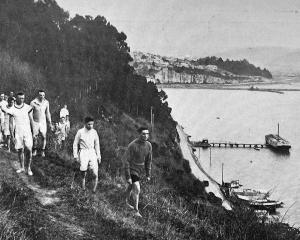This is what it is to have a candid friend. That it is possible for a candid friend to exaggerate may be seen in certain remarks about Balclutha, where prohibition is in force. "Let's get out of this," said a companion with whom he visited Balclutha; "it puts me in mind of a cemetery".
I asked several how prohibition worked, or, rather if it had improved the place. They all said the town was better - it was quieter. That was just what it was. It was quieter, with a deadly quietness - a quietness that got on to your nerves.
Now this is unfair. "There are in England, unblighted as yet by prohibition, scores of provincial towns as deadly dull as poor little Balclutha. Take a vignette from Dickens, always a competent observer: Mr Pumblechook the seedsman appeared to transact his business by looking across the street at the saddler, who appeared to transact his business by keeping his eye on the coachmaker, who appeared to get on in life by putting his hands in his pockets and contemplating the baker, who in his turn folded his arms and stared at the grocer, who stood at his door and yawned at the chemist. The Watch-maker, always poring over a little desk with a magnifying glass at his eye, and always inspected by a group in smock frocks poring over him through the glass of his shop window, seemed to be about the only person in the High street whose trade engaged his attention."
But that prohibition, if such an insanity overcame us, would make of Dunedin a Balclutha, seems to me by no means incredible. There are, as "Ex-Dunedinite" suggests, many good and useful citizens who would prefer to live elsewhere, as a bird prefers to live outside a cage. Not with impunity may you take from men who are not abusing it a freedom which has always been an endowment of the race. There being no limit to human folly, the reign of compulsion may have its day.
But it will not and it cannot come to good. - Civis.
• Recently a report appeared in The Press stating that rabbits were increasing at an alarming rate in parts of North Canterbury. According to reports that have from time to time reached the Ashburton Mail, it would appear that the remark, in a modified degree, is also applicable to the Ashburton district.
A reporter, who made inquiries regarding the increase of "bunny", learnt that it was chiefly due to the fact that the river-beds were getting thickly covered with broom and gorse, and this afforded breeding-places for the pest; in fact, they were ideal sanctuaries in this respect.
This resulted in the rabbits spreading over the adjoining country.
It is urged that the time has arrived when steps should be taken by the responsible authorities to have the gorse and broom in river-beds, as far as possible, systematically cut down and burnt, and in localities where the rabbits are numerous poison should be laid under proper supervision as a means towards exterminating the pest. - ODT, 15.7.1911.












